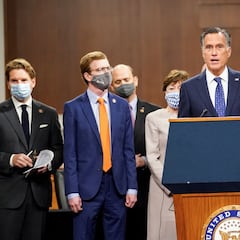What has Congress said about the government shutdown deadline?
If the Senate and the House of Representatives are unable to agree a new government spending bill before 11 December, many federal programmes will be cut short and staff will be placed on furlough.


Congress was back in session this Monday at the start of the final three-week session of 2020. After a chaotic year there is still much to be agreed before lawmakers break for Christmas with crucial pieces of legislation needed to keep the government operating effectively.
The number one priority for Congress will be to pass a $1.4 trillion governmental spending bill to replace the one which expires on 11 December. Failure to do so would lead to a government shutdown, disrupting federal programmes and placing federal workers on furlough, unthinkable during a nationwide public health emergency.
Congress has a LOT of work to do (Covid relief, funding bill, etc) and is running out of time to do it in.
— Eugene Daniels (@EugeneDaniels2) December 2, 2020
So I zoom'd with @MZanona about what the 116th Congress has on its last to-do list and who is holding it up.
FULL 👉🏾👉🏾👉🏾 https://t.co/uNETnXjNIY pic.twitter.com/4CFNA1isCF
Also on the agenda is signing another covid-19 economic relief package, agreeing a national defence budget and there are still some judicial nominations to be made before President Trump leaves office. Congress will have to work closely with the President to ensure that he is willing to pass the final deal, offering him enough concessions in the final weeks of his presidency.
How are negotiations over the spending bill going in Congress?
The spending bill provides funding for nearly all federal agencies and is critical to the continued running of the government. The total budget of $1.4 trillion has already been agreed but the Democrats and the Republicans are at odds over how that money is spent.
NBC reports that the two sides are split on using “sleight of hand to add a 2 percentage point, $12 billion increase to domestic programs to accommodate rapidly growing veterans health care”. Also in the mix are Trump’s continued demands for more funding for his US-Mexico border wall. However the bulk of the negotiations will focus on the 12 annual spending bills which are passed through Congress each year on a bipartisan basis.
Could the 11 December deadline be pushed back?
With little over a week to go before the current spending bill expires, some are suggesting a short-term fix to buy Congress some more time to negotiate. They could pass a stopgap spending bill, also known as a continuing resolution, which would essentially just move the decision into next year.
This may be a useful option if Trump is unwilling to pass a spending bill that does not include border wall provisions, or is just not to his liking. Earlier this week Trump announced on Twitter that he would veto the $740 billion National Defense Authorization Act unless it includes a condition scrapping Section 230, a federal law that protects tech companies from liability over content posted by users.
Trump threatens to veto the annual defense policy bill (which includes an annual pay raise for troops) unless it includes language to eliminating Section 230, a law that provides legal immunity for user-generated content online, creating the open internet as we know it. https://t.co/2oxo9rWtGe
— Lindsay Wise (@lindsaywise) December 2, 2020
In late 2018, Trump refused to sign the year’s spending bill because of a dispute over funding for the border wall, triggering the longest government shutdown in US history.
McConnell calls for covid support to be included in spending bill
Despite the months of fractious discussion over the fate of the next covid-19 stimulus package, Leader of the House Nancy Pelosi and Senate Majority Leader Mitch McConnell are eager to work together to get a new spending bill passed. Both are seasoned congressional operators are will be desperate to avoid just kicking the issue into next year.
Earlier this month Senate Republicans released 12 funding bills that would cover the government’s cost until next September and McConnell has suggested that he would be willing to pass a spending bill that include some covid-19 economic relief. After a recent meeting with other Republican Senators he told reporters: “We need a targeted relief bill”.
McConnell says if COVID-19 aid were to pass in the lame duck it would probably be part of the year-end spending bill.
— Chris Cioffi (@ReporterCioffi) December 1, 2020
Related stories
McConnell and other Senate Republicans have proposed a $500 billion stimulus package that Pelosi has dismissed as insufficient. Reuters report that McConnell is now considering a joint government spending and covid-19 relief bill, having discussed the matter with the White House to find a package that the President would be willing to sign.
However this plan includes just $332.7 in coronavirus financial relief, in the form of new loans and grants to small businesses. This is just a fraction of the $3 trillion HEROES bill that the Democrats first proposed in May, suggesting that Congress is in for some tough negotiations in the coming days.

